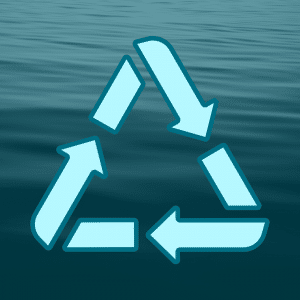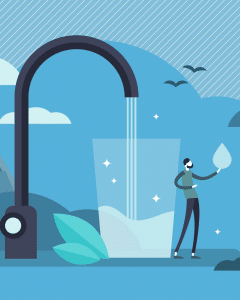Did you know that every single drop of water on earth has existed for billions of years? The water in the oceans, rivers, ice-caps, storm clouds, and even inside of us has been perpetually cycling through the planet since it first arrived.
According to geochemical studies, it has been said that water arrived on earth with asteroids from space. The molecules that form water were on an incredible voyage, likely for millions of years, before they reached our planet. And while water is such a familiar aspect of our world, larger bodies of water formed hundreds of millions of years after the planet took shape.
So aside from the notion that any and all drops of water we have encountered have been inside of oceans and dinosaurs – what else makes water so strange?
Breaking All the Rules
For one, water simply does not follow the ‘normal’ rules of chemistry. Given the properties of its makeup, water should exist as a gas. A water molecule is made from two very light atoms – hydrogen and oxygen. At the ambient conditions on the surface of the earth (temperature and pressure), this molecule should be a gas. For example, hydrogen sulfide is a gas even though it has twice the molecular weight of water.
Freezing and Floating
Another strange thing about water is that when it freezes, it expands. Most substances shrink when they transform from a liquid to a solid since molecules are packing more densely together. Think about what happens when you fill an ice tray with water. The next morning, ice is protruding out over the edge of the tray. On top of that, the frozen water floats. What happens when you drop any other solid into a liquid? It sinks. This phenomenon is called hydrogen bonding and occurs when polar ends with opposite charges of water molecules attract to other water molecules. The bond is not strong though and can be broken by heating the solid over 0 degrees Celsius.
Freezing Cold Hot
You might have noticed at some point or another that hot water freezes faster than cold water. This is known as the Mpemba effect. For hundreds of years, scientists and mathematicians have been trying to figure this out – but it was not until 2013 when something clicked. A research assistant at the University of Zagreb claims that convection currents in warm water cause it to cool more rapidly.
Up, Up and Away
Gravity – what goes up, must come down. Not necessarily with water though. Water molecules can float upwards against the force of gravity. This process is called capillary action.
Want to learn more about why water might just be the strangest thing in the universe? Check out this video produced by BBC.



